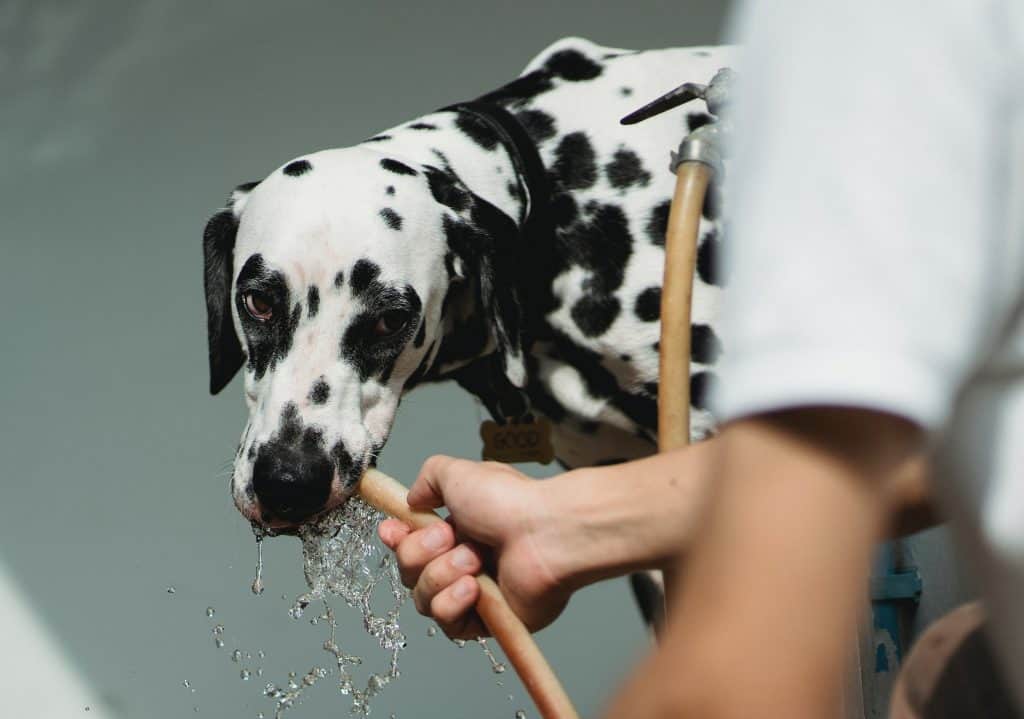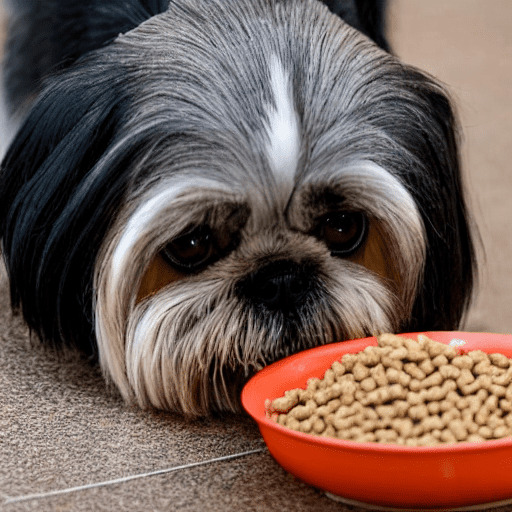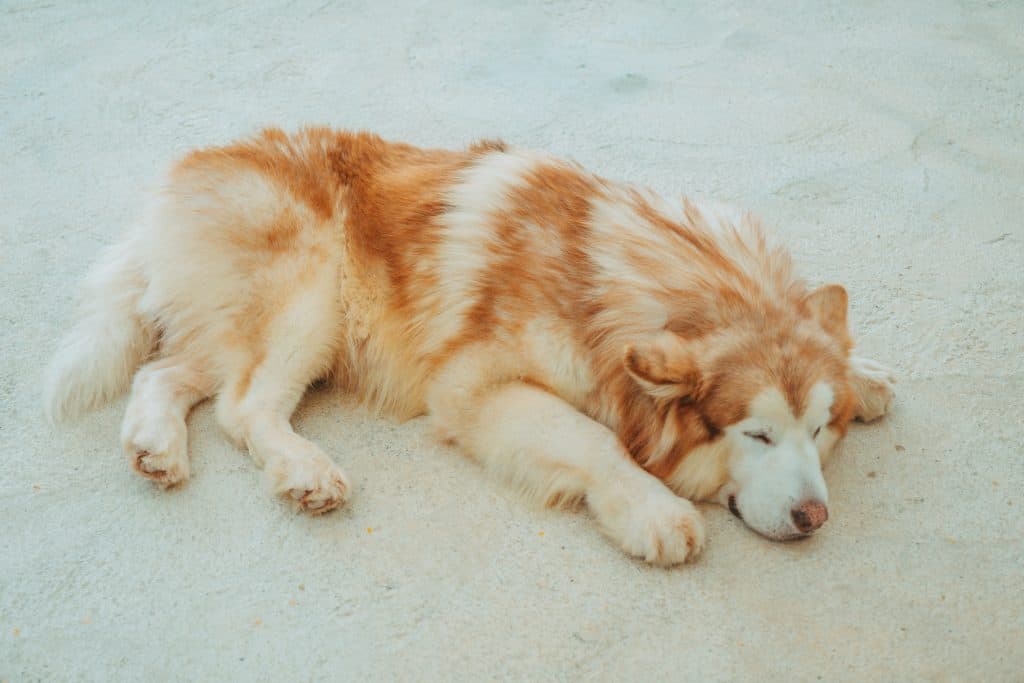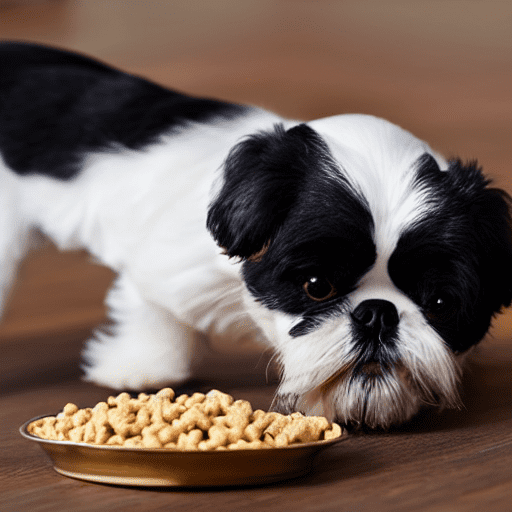We all know the value of a healthy, nutritious diet for our beloved four-legged companions. When dogs stop eating, it can be worrisome for pet owners. If your pup is not eating but still drinking water, you may be wondering what could be causing this lack of appetite. In this article, we’ll look at some key reasons – from changes in diet to stress or anxiety and even illness. With this knowledge in hand, you’ll be prepared to approach any potential dietary issues with your pup confidently and effectively.

Dog Not Eating But Still Drinking Water (3 Reasons Why)
Changes In Diet
One of the most common reasons your dog isn’t eating but is drinking water is due to changes in diet. If you recently switched them to a different type of food, it’s possible they don’t like it as much as their old food. The best way to remedy this situation is to gradually introduce the new food by mixing it with the old one until they consume only the new food.
If your dog is still not eating but still drinking water, try slowly transitioning them to a new food. Start by mixing the old and new foods, gradually increasing the amount of the new food in each meal over time until your dog has completely transitioned to their new diet. It is advised not to feed your dog table scraps or human food, as this can lead to nutritional imbalances and health problems. In addition, make sure that the food you give them is fresh and of good quality. If none helps, it is best to take your dog to the vet for a check-up to rule out any underlying medical conditions.
Stress or Anxiety
If your pup has been particularly stressed out lately, it can lead to dogs not wanting to eat, despite being thirsty. If you think stress or anxiety contributes to why your pup isn’t eating but is drinking water, make sure you give them plenty of attention and comfort during mealtime. Calming supplements such as CBD oil may help reduce their stress levels and encourage them to start eating again.
If your dog is still not eating but drinking water, it is important to take them to the vet for an evaluation. The vet can do a thorough physical examination and laboratory tests to identify any underlying medical issue causing your pup’s decreased appetite. Depending on the cause, the vet will suggest appropriate treatment options or dietary changes that could help your dog get back on track with their eating habits.
Illness
Another reason why a dog may not be eating, but drinking water, is an illness. Illness can range from something as mild as an upset stomach to something as serious as cancer or kidney failure.
Other common illnesses such as allergies and infections can also cause loss of appetite. In addition to refusing food, your dog may show signs of dehydration due to vomiting or diarrhea, increased thirst, lethargy, and decreased activity.
If your pet has any of these symptoms it is important to seek veterinary attention immediately in order to assess the underlying cause of their illness. Your vet can provide a proper diagnosis and suggest appropriate treatment options or dietary changes that could help your dog get back on track with their eating habits.

Dog Won’t Eat But Drinks Water (Investigating Causes)
There are a few things you can check to try and determine why your dog is not eating but drinking water, some of which are:
Check Their Teeth
If your dog refuses food, it could be that they are in pain from an oral issue such as bad teeth or gums. Check their mouth and teeth for signs of infection or other issues that could be causing them pain when they eat. If you find something, contact your vet for how to treat it. Getting a dental cleaning done by a professional groomer or veterinarian may also be a good idea if your pup’s teeth have been neglected for a while.
Look at Their Diet
It’s important to look at what kind of food your pet eats and ensure it provides the nutrition they need. Does the food contain enough protein? Is it high in fat? Are there any artificial preservatives or flavors used in the food that could cause stomach upset? Ensure you’re feeding them a healthy diet with plenty of vitamins and minerals to stay in good shape even when they aren’t eating as much as normal.
If you think their diet might be boring, try changing the type of food you give them or adding new ingredients like cooked vegetables or fresh fruit. You can add wet food, canned meat, and treats like liver or cheese cubes to make their meals more interesting and appetizing.
Dogs also enjoy variety, so rotating foods throughout the week can help keep them interested in mealtime. Some dogs prefer certain flavors and textures over others, so experiment with different options until you find one that works for your pup!
Change Their Environment
Sometimes, a change of scenery can boost their appetite. Try feeding them in a different room or location of the house, like outside or on the balcony if you have one. This can also provide mental stimulation as they explore and become familiar with new sights and smells.
Outdoor stimuli such as bird sounds or squirrels running around could be exciting for some dogs and help make mealtime more interesting.
Increase Their Activity Level
Your pup may be bored with its current routine, so increasing its activity level might help to stimulate its appetite. Take them on a walk or a run around the block before mealtimes, or give them a toy or puzzle to play with that will require some mental stimulation.
Adding Flavorful Toppings
Adding flavorful toppings to their meal can make them more appealing and stimulating. Add some cooked egg, canned pumpkin, cheese, or yogurt – all of which are highly palatable and healthy for your pup.

When should I worry about my dog not eating?
The best way to determine if your dog’s lack of appetite is something to worry about is to pay attention to other symptoms that may indicate an underlying condition requiring medical attention. Here are some warning signs you should watch out for if your pup stops eating:
Weight Loss: If your dog has stopped eating but continues to lose weight without any explanation, this could indicate an underlying health issue that needs to be addressed quickly by a veterinarian (e.g., pancreatitis).
Dehydration: If you notice that your pup isn’t drinking water either, this could indicate dehydration due to poor nutrition or another health issue (e.g., kidney disease).
Lethargy/Weakness: If a dog is not eating but drinking water and sleeping a lot, it could indicate that something is wrong other than a lack of appetite, as this could be accompanied by a decrease in energy levels. (e.g., diabetes).
Unusual Behavior: If you notice any sudden changes in behavior, such as aggression towards other animals/people, then this could also suggest something else going on other than just refusing food (e.g., anxiety).
Vomiting/Diarrhea: These two symptoms usually occur together and indicate something more serious than being picky about food (e.g., intestinal parasites).
My dog is not eating but drinking water and vomiting.
If your dog refuses to eat but vomits, it could indicate an underlying digestive issue. Several possibilities exist in identifying the cause of your pup’s lack of appetite.
Some possible causes include the following:
Gastrointestinal issues: Your dog may suffer from gastrointestinal distress such as indigestion or an upset stomach due to food allergies or intolerance. It’s important to rule out any dietary issues before considering other possibilities.
Infections: If your pup has an infection—such as parvovirus—it can cause them to not feel like eating anything. This is especially true in younger puppies, which may be more susceptible to infections than older dogs.
Parasites: Parasites are another common cause of loss of appetite in dogs. Common parasites include worms, fleas, ticks, and mites that can be transmitted through contact with other animals or contaminated environments.
Stress/Anxiety: Stress or anxiety can also lead to a decreased appetite in some dogs. This can be caused by changes in routine, new environments, or even being left alone too often. If you notice that your pup is exhibiting signs of stress or anxiety, then it’s important to address this issue before considering any medical intervention.

Other Symptoms To Look For
In addition to a lack of appetite and vomiting after drinking water, several other symptoms could point toward underlying health issues. These include:
- Diarrhea
- Weight loss
- Lethargy
- Vomiting bile (a yellowish fluid)
- Pale gums
- Increased thirst/urination
- Bad breath/halitosis
Suppose you’re noticing additional symptoms, including a lack of appetite and vomiting after drinking water. In that case, it’s important to seek veterinary care immediately, as these could be signs of a serious problem such as kidney disease or diabetes mellitus.
How can I stimulate my dog to eat?
If you want to make your dog eat, you can try several different methods. First, try offering your pup something especially appealing, such as high-value treats or wet food. You can also change the mealtime environment to make it more inviting.
For example, try setting up a cozy corner with blankets and pillows or play some relaxing music while they eat. Finally, ensure that your pup gets adequate exercise and mental stimulation throughout the day, as this can help reduce stress levels that can impact appetite.
Even if your pup isn’t eating regularly, it’s important to keep offering food twice daily so that you can monitor their intake and weight gain/loss. If you continue to notice a lack of appetite, it’s best to consult your vet to know the underlying cause and develop an appropriate treatment plan.
If you’re still concerned about your dog not eating but drinking water, there are other options to explore. One alternative is to provide your pup with a high-calorie, nutrient-dense meal replacement product that can be administered via a syringe or spoon. This can help ensure they get the necessary nutrients even if they are not eating regularly. Additionally, consider offering different types of food to entice them and offering small meals throughout the day rather than two large ones.
Finally, it’s important to note that there could be some underlying medical issues causing your dog’s lack of appetite and drinking water excessively, which a licensed veterinarian should address. So if your pup isn’t eating but drinking plenty of water and exhibiting other signs such as lethargy or vomiting, you should take them to a vet as soon as possible.
Frequently asked questions
What are the symptoms of dehydration in a dog?
Dry gums usually characterize dehydration in dogs, sunken eyes, decreased skin elasticity, and excessive thirst. If your dog is exhibiting these symptoms and not eating but drinking water excessively, you should take them to the vet ASAP.
How long can a dog live without eating but drinking water?
It varies from dog to dog, but a general guideline is that a healthy adult dog can usually go up to two weeks without eating. However, if your pup isn’t drinking water or exhibiting any other signs of illness, it’s best to take them to the vet.
What do you feed a sick dog with no appetite?
When your dog is sick and has lost their appetite, it’s vital to encourage them to eat. If your pup isn’t responding to traditional dog food, try offering them a small amount of plain cooked chicken or white fish, cooked vegetables such as carrots or sweet potatoes, boiled eggs, cottage cheese, yogurt, or natural peanut butter.
How can I increase my sick dog’s appetite?
If your pup isn’t eating due to illness, it’s necessary to get them to the vet as soon as possible. Medications or supplements may be prescribed if necessary. In addition, try offering food at different times of day, in smaller portions, and with different textures. Consider adding a bit of canned pumpkin, cottage cheese, or yogurt to their food to make it more palatable.
You can also warm the food slightly to increase its smell, which could entice your dog to eat. If they still don’t eat, try offering them a small amount of plain cooked chicken or white fish, cooked vegetables such as carrots or sweet potatoes, boiled eggs, cottage cheese, yogurt, or natural peanut butter.
Dog not eating but drinking water(Closing Thoughts)
In conclusion, if your dog is not eating but drinking water, try different approaches to help get them back on track. Speak with your veterinarian to rule out any underlying medical issues causing the problem and obtain advice on how best to proceed.
Additionally, work with a qualified animal nutritionist who can provide personalized diet advice and help address any underlying nutritional deficiencies. Finally, try out different food items to see what your pup likes, and provide them with plenty of fresh water throughout the day. With patience and dedication, you can get your dog back to eating regular meals in no time!
Recent Posts
As a dog owner, you want to ensure that you take proper care of your furry companion. A common question that many pet owners have is, "Can I walk my dog 30 minutes after eating?" Understanding the...
Have you ever considered getting an elevated dog bed for your furry friend, but wondered if it's worth the investment? If so, you're not alone. As dog owners, we all want to provide the best care for...

